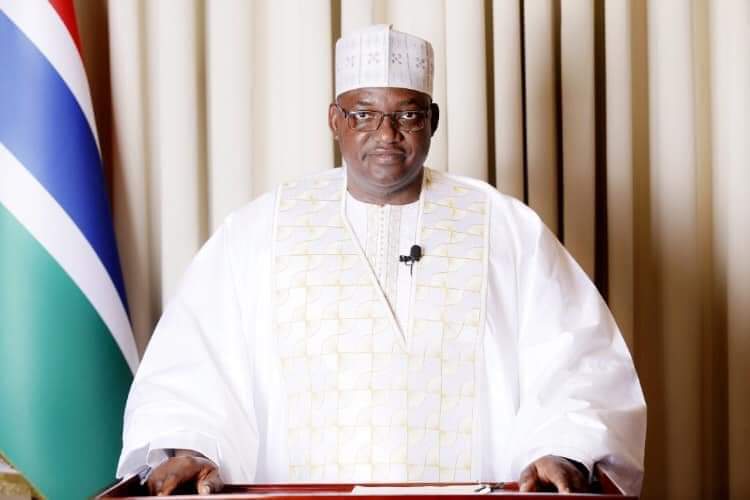 President Adama Barrow’s speech to the nation Friday evening on the coronavirus outbreak threat was impressive and, in many ways, and reassuring. He got few critical things deeply flawed, and it omitted measures to provide relief to businesses and individuals hit by the impact of coronavirus outbreak on the faltering economy and how Adama Barrow could do to help the economy.
President Adama Barrow’s speech to the nation Friday evening on the coronavirus outbreak threat was impressive and, in many ways, and reassuring. He got few critical things deeply flawed, and it omitted measures to provide relief to businesses and individuals hit by the impact of coronavirus outbreak on the faltering economy and how Adama Barrow could do to help the economy.
President Barrow’s communications team should read and watch other world leader’s speeches, including the person who writes his often colorless, disjointed, and’ tongue in cheek’ speeches. President Barrow, in the address to the nation on coronavirus pandemic, should have been on a simple message, on point refreshing and reassuring and not haphazard.
However, the economic implications of this coronavirus pandemic for the Gambia’s already faltering growth deserved more than what President Barrow announced.
Coronavirus pandemic has directly affected nearly 586,455 individuals globally, including less than ten Gambian citizens as of March 27, 2020, today.
While I have extended my wholehearted support to the Gambia government and civil society groups in its initiatives to tackle the current situation, it is essential that the government also pay attention to the economy, especially in light of our bearish economic situation, if it seeks to address the present reality comprehensively.
President Barrow’s speech is not methodologically sound. From what the global scenario looks like, to what the Gambian situation is, to what we should expect in the near short term, to how we should prepare both psychologically and in terms of medical infrastructure, to what may adversely happen in future, including economic stagnation, potential job losses, total lockdown and what the government is doing to mitigate.
Adama Barrow should be talking to everyone – from the elite, business community, the freelance gig economy workers, the unemployed, the retrenched to the ordinary man on the streets in chunks of coherent implementable promises by the government, and what is expected of the ordinary citizen, in a non-condescending way.
In the end, rallying the nation together and appreciating the people that you lead for what you have achieved so far as a nation is what every Gambian is expecting to hear amid this deadly pathogen.
Moreover, the government does not issue directives in vain; when such directives are issued, the national is often forewarned and psychologically prepared.
President Barrow must not issue empty “Laahidoo’s, nor should he make saber-rattling meant for his audience. It is a government that acts must on its words. The resolve does not need to shout or sound alarming. The resolve is found in the track record and reputation of the government.
What makes citizens aware of what is expected of a government in times like these and the consequences of non-adherence. That is what makes a government believable. This is leadership.
The majority of the operations of small and medium enterprises have been severely affected, with some coming to a halt in this environment.
This affects all those working in such small businesses, as well as entrepreneurs, the self-employed, and others. Not only have their incomes reduced but also their ability to address recurring costs such as monthly installments on existing loans.
President Adama Barrow in addressing the nation, therefore, consider a variety of financial steps that could help Gambians deal with the crisis, such as offering a moratorium on existing loans (within a specified threshold and for a specified period), an extension of the deadline to file tax returns, as well as steps to ensure that no workers are dismissed during this period of economic inactivity.
We have already seen such measures being implemented in nations around the world. To minimize the economic impact of the coronavirus outbreak on vulnerable families, countries such as South Africa, Senegal, Ghana, and Nigeria are giving wage subsidies. South Africa is helping smaller firms by reducing the tax burden and ensuring unemployment benefits are paid on time.
What is missing in the President’s speech? Adama Barrow and his government must also act. In the Gambia’s case, because the virus has not reached the pervasive stage it has elsewhere, we have a unique opportunity to implement this before the situation escalates further.
The government should consider urgent relief to the Small and Medium Enterprise (SMEs) and Micro, Small, and Medium Enterprises (MSMEs) in the form of soft loans to meet their operational expenses. This is especially important for those enduring delays in payments from overseas.
Even as the government helps small and medium businesses and those employed by them, they must also pay attention to participants in the informal economy, fellow citizens who cannot stay at home since it will affect their daily income – quite literally their family’s daily bread. For these poorer Gambians, the Barrow government must look into a range of interventions, such as offering a temporary aid package that can help them tide over the current crisis.
Irrespective of what protocols they implement, we cannot allow these to affect the poor further and marginalized within our society. They need and deserve the utmost support from their government.
However, government officials think that preparing for a broader Coronavirus outbreak is a secret they have to keep for their benefit. Nobody is talking about medical infrastructure or what the mechanics of a total lockdown could look like.
Furthermore, when the going gets tough, they dump returning citizens in a hotel for self-isolation that are entirely not suitable for a medical facility. The Coronavirus threatens to overwhelm the Gambia’s health care system with too few ventilators and insufficient quarantines centers in all regions worth the name, except we must go to the Golden Beach Hotel in the Greater Banjul.
In turn, the coronavirus pandemic, the tourism industry has taken a devastating hit as travel restrictions everywhere, and coronavirus fears take their toll. Tourism is effectively at a standstill, and even domestic tourism has dried up. Operators are devastated because many have been running their businesses through loans from banks and investors.
Of course, when businesses suffer, the government collects less corporate tax as well, leaving itself less well-equipped to find the resources to bail businesses out. However, the nettle must be grasped.
If the Gambian economy is not to go under altogether, serious relief measures are needed to buffer the shock being felt by individuals and companies throughout the country.
Absence in President Barrow’s speech of calling poverty drenched psychologically unprepared Gambian, whose only crime is seeking their daily bread.
The government cannot understand this desperation because their approach is elitist. What is the incentive for someone living in the informal sector to self-quarantine? What have they not seen? What is their incentive to live and see another day?
Poverty is desperate like without asking what their government is doing for the most vulnerable in society. Not knowing that an extended drawn total lockdown can lead to social upheaval, unrest, and insecurity, so that they may never enjoy the contents of the “full fridge” in peace.
In President Barrow’s half baked announcements that he has released money GMD 500 million – to the Health Department for the coronavirus outbreak, for what use and for whose benefit? – realized from the recent demonetization exercise. If the government is not ready with an announcement in a structured manner, do not make it!
An angry government, giving stark warnings to business communities and supermarkets for increasing prices of essential commodities, but they go-ahead to do so. We are conflicted about leadership. The same supermarkets also buy from entities owned by very senior members of the executive.
Insane countries, once one becomes a senior member of the executive, cease to do business with the government.
Ongoing business interests are placed in a blind trust, where the government official is prohibited from running day to day affairs.
Suppose the Gambia’s Coronavirus numbers grow beyond one thousand nobodies is speaking about expanding Intensive Care Units(ICU) facilities and ramping up medical equipment available, including ventilators by, for example, the potential of temporarily “nationalizing” private hospitals, etc. Nobody is preparing the public for that possibility.
This is about purposeful, practical action, and vision led scenario building led by dedicated leadership, devoid of empty Public Relation excitement.
Everything rises and falls on leadership. If we do all this, with the wealth of capable experts directing the Gambia’s initiatives as well as the steadfast resoluteness that Gambians have historically displayed in challenging times, together, as a nation, we can and shall overcome even the current crisis.





